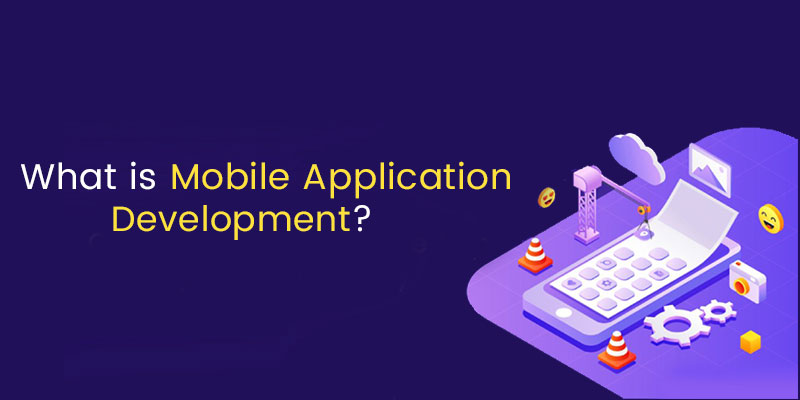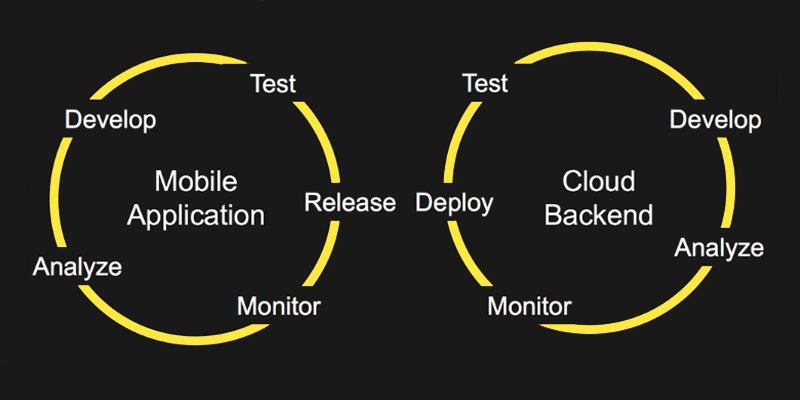
Mobile development has brought drastic transformation globally and for everyone who merely depends on the mobile application. The lives of individual and their everyday usage of mobile phones have paved the way for the demand for mobile app developers. Moreover, it provides ample scope for developers to demonstrate their creative ideas for building user-friendly apps.
To become a mobile app developer, you can join Mobile App Development Courses in Chennai and learn the core concepts of native and mobile app development software.
Mobile app development has overwhelmed the business world compared to the previous year. This has become a great advantage for app-based companies, and revenue has skyrocketed. According to the survey, the iOS and Android app revenue reached $110 billion, marking a 25% year-over-year increase. Games apps accounted for 72% of the total mobile app revenue in 2020. Google Play made $31.8 billion, whereas iOS gave rise to $47.6 billion in revenue. So, users' spending on the app store is expected to reach $200 billion.
In this blog, we shall discuss web development vs app development, native app development, languages for ios development, and the best technology for mobile app development. Before studying these concepts, we shall discuss what mobile app development is.
What is Mobile Application Development
It is the process of creating software-based applictaion that can be utilized for running on mobile devices. Typically, a mobile app uses an internet connection to work with remote computing resources.
Mobile development is the process of building feasible and installing applications. Mobile application development is creating software applications that run on a mobile device, and a typical mobile application utilizes a network connection to work with remote computing resources. So, the steps in developing a mobile app include:
-
Assemble software bundles for installation (code, binaries, assets, etc.).
-
Use an API to implement back-end services, such as data access.
-
Test the software on the intended hardware.
Mobile Applications and Device Platforms
Currently, two mobile app applications are rising in demand, and the two modern smartphone platforms are the iOS platform and Android from Google.
-
Apple's well-known iPhone smartphone range is powered by the iOS platform as its operating system.
-
Google devices use the Android operating system, and many other OEMs also use it to create their smartphones and other smart gadgets.
Though they have great differences in their models, the two mobile platforms have similarities in building and developing applications, but the usage of developing software tools is different.
Apple utilizes the iOS platform for its devices, whereas other businesses can use Android if they comply with specific criteria, such as shipping devices with particular Google apps.
By focusing on both platforms, developers may create apps for hundreds of millions of devices.
If you want to become an iOS developer, you can join iOS Training In Bangalore and learn the features and elements of iOS.
Alternatives for Building Mobile Apps
When developing mobile applications, there are four main ways.
-
Native Mobile Applications
-
Cross-Platform Native Mobile Applications
-
Hybrid Mobile Applications
-
Progressive Web Applications
All the above application has their advantage and disadvantage. So, developers play a vital role in choosing the right application for their project. Developers take into account the desired user experience, the computing resources and native features needed by the application, the development cost, time targets, and available resources for app management are the best development approach for a project.
Native Applications
The platform owner creates the programming language and frameworks for native mobile applications. It can run directly on the device's operating system, such as iOS and Android.
Cross-Platform Applications
Cross-platform native mobile applications are written in various frameworks and programming languages. It can be integrated into a native program on the device's operating system.
Hybrid-Web Applications
Standard web technologies like JavaScript, CSS, and HTML5 create hybrid mobile applications packaged as app installation packages.
In contrast to native apps, hybrid apps operate on a "web container" that offers a browser runtime and a gateway for native device APIs through Apache Cordova.
Progressive Web Applications
By avoiding app store delivery and installation, progressive web applications provide an alternative to conventional mobile app development.
Progressive Web Applications are web applications that use features offered by browsers, including the ability to work offline, run a background task, and add a link to the device's home screen.
Why Choose the Hybrid/Cross-platform Approach?
There might be various reasons for choosing hybrid and cross-platform; one prominent reason is that native app development requires high skill sets. Though they are different developers for C and Java (the language is written in native), only a few developers are skilled in the programming language, frameworks and IDEs.
So due to this, skilled app developers are in demand. Many top companies are seeking to hire skilled candidates. To become a mobile app developer, you can join Mobile App Development Course Online and learn how to build a user-friendly app and the procedures and processes used in writing software.
How Do Hybrid and Cross-platform Frameworks Work?
Hybrid apps let developers use Hypertext Markup Language revision 5/Cascading Style Sheets/JavaScript web technologies and then compress those web applications in a container that permits the web application to operate like a native application on the device.
Most of the code from a web app is used to construct a mobile app because hybrid mobile apps are simply web apps running in an embedded browser environment. For web developers who want to create mobile apps rapidly, hybrid development is a feasible solution as mobile browsers' rendering and runtime speed continues to improve.
Like traditional web applications, progressive web applications are accessible primarily through a browser on the device or computer. They are created using traditional web application programming methods, including JavaScript, HTML5, and CSS.
For more excellent performance, specific cross-platform frameworks, like Flutter and Xamarin, compile cross-platform code into native code. Others, like React Native and Native Script, allow native components to interact with cross-platform code.
The Mobile Application Development Lifecycle
A mobile application's two interconnected fundamental elements are as follows:
1) The "Front-End" of the mobile application on the mobile device.
2) The "Back-end" services that help the mobile front-end.

Front-end vs. Back-end
Mobile applications evolved in the early years of the modern smartphone application age, akin to the first websites. Initially, the websites and applications were self-contained and operated primarily as static ads for the company, brand, product, or service.
The apps became more flexible as they were able to update their User experience and content with data received over the network from queries to data sources. Still, as connectivity and network capabilities improved, the apps became more connected to sources of information and data that lived outside of the app itself.
As a result, back-end services that enable data to be accessed through the mobile front-end are increasingly used by and integrated into mobile front-end applications.
Such information may consist of e-commerce apps, product information or flight information for travel and reservation apps. The data for a mobile game can include new levels, player scores, or avatars.
How Front-end' Talks' to the Back-end?
From the back end, the mobile front end obtains data through different service calls, such as the application programming interface.
These APIs may occasionally be owned and run by the same company that creates the mobile application. In other situations, a third company may be in charge of the API, and the mobile application is given access through a business deal.
For example, the developer will connect with the advertising company for the services to advertise or obtain social media. These APIs may occasionally be owned and run by the same company that creates the mobile application. In other situations, a third company may be in charge of the API, and the mobile application is given access through a business deal.
If you want to become an android developer, you can join Android Training in Chennai and installation of Android Studio, understand the Life cycle methods, and many more.
Why do Developers Use a Cloud-backend?
Mobile developers are responsible for building an application. Moreover, they are responsible for creating, building, developing, and managing the back-end services. The mobile application developers are not the most skilled experts running a back-end infrastructure.
In this case, developers might decide to utilize a cloud services provider — a backend-as-a-service provider. A backend-as-a-service provider manages all heavy work so that developers can easily focus on building the features in the apps without caring about security, reliability, and flexibility.
The Mobile Application Front-End
As a user, we tend to focus on the visual part of the mobile. So, we mostly interact with the front end of the mobile phone. On all our mobile, we might have default apps displayed on the screen or download the app from the google play store. Moreover, in the case of PWAs, they can be accessed through the device's browser.
How Does a Workflow for Front-End Development Look?
Mobile app developers are referred to as programmers because they mainly work with the application's front end. The developer is skilled in programming language and the latest technologies. Being proficient in these new skills helps them interact with the front-end application.
The developer and many other people would coordinate the development process based on the project. They always work with the design team for the best outcome.
For example, while building a user-friendly app, they tend to work with the graphical, creative, and designing teams to produce attractive visual apps. So, these colossal team members cooperate to create elements such as icons, colours, background colours, themes, features and other components of the apps.
Furthermore, they outsource the user interface and user experience design. If the app is game-oriented, the developer works with the motion graphical designers or developers and mainly with th engineers. So, engineers play a vital role in game development as they are responsible for giving a motion to the game. For example, to the car right or left.
How do Mobile Apps Integrate with the Back-end?
Regardless of the team size, creating the logic for the app that will make network calls to the back-end services, collect data, and update data in the back-end systems with new information generated by the app is a crucial part of the development effort.
The most prevalent application programming interfaces, or APIs, are often used to access these back-end services. There are numerous sorts of APIs, including REST and GraphQL, as well as numerous methods and accessing styles.
Some back-end service APIs are accessible to applications directly through platform calls. Still, many more specialized services must be linked to the app through a software development kit or SDK.
The application can use the APIs described in the SDK once the SDK has been added via the development environment.
Significant Mobile Application Services
Mobile application developers can take advantage of a vast array of cloud-based and third-party services to accelerate the creation and distribution of their applications.
A developer, however, is unlikely to be able to become an authority in each of these particular services.
Instead, mobile developers should seek a development environment that enables them to integrate swiftly, apply, and consume the most frequently needed features into their applications while still utilizing the various services offered.
Essential (User Registration, Login, and Management), Data Services, and Machine Learning. Now, you would have understood web development vs app development, native app development, languages for ios development, and the best technology for mobile app development. So, to become a mobile app developer, you can join Mobile App Development Courses in Bangalore, which will help you understand the basics of JavaScript and the best technology for mobile app development.